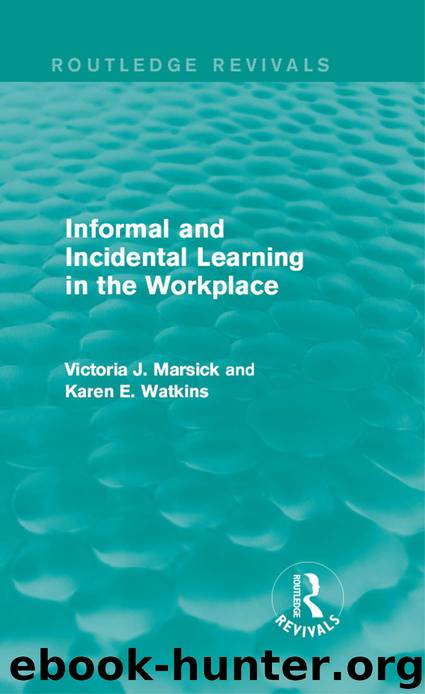Informal and Incidental Learning in the Workplace (Routledge Revivals) by Victoria J. Marsick & Karen Watkins

Author:Victoria J. Marsick & Karen Watkins [Marsick, Victoria J.]
Language: eng
Format: epub
ISBN: 9781317505440
Publisher: Taylor and Francis
Published: 2015-06-10T22:00:00+00:00
Action science
The theoretical perspective used in this chapter is action science. Action science is concerned with interpersonal action that produces knowledge which is disconfirmable. Action science offers people who choose its values an alternative way to frame and solve problems (Argyris et al. 1985). Individuals report specific incidents of their practice – what was actually said, thought, and done. These incidents are then examined with almost scientific detachment for underlying themes or patterns. Action scientists search for clues regarding the dysfunctional behavior of the individual. Was it in the person’s thoughts? Did they, in other words, make inferences and attributions without data to support them? Were they stuck in one way of framing the situation? Was it in what they said or did? Perhaps there is a discrepancy between what they thought and what they said? Is there a lack of skill in communicating difficult or complex information? Or is it a product of the individual’s norms, such as a norm that it is not polite to share negative feedback?
Through a “scientific” analysis of questions such as these, new knowledge about the situation is developed. This knowledge can be stated in terms that permit individuals to try out alternate actions, to analyze them again, and then decide whether or not this knowledge was accurate and usable. The generation of alternatives is facilitated by the normative framework for interpersonal action, Model II, in action science. Double-loop learning or Model II is a normative model which suggests that human interpersonal action is more effective under conditions of reciprocity, openness to learning, and internal ownership or commitment to the alternative action or choice. Individuals present as problems situations in which they violate their own goals or values. By reflecting on what the individual did that contradicted those values, what competing pressures or reasoning may have led to the contradiction, and clarifying what actions would more consistently fit those values, individuals are encouraged to redesign their actions based on their own values. In Argyris and Schön’s terms, this leads to action that fits two larger societal values, competence and justice.
In the following pages, the action science perspective and techniques for analyzing case incidents from an individual’s practice will be used to examine the incidental learning of the learning facilitator or interventionist and of the learning group.
Download
This site does not store any files on its server. We only index and link to content provided by other sites. Please contact the content providers to delete copyright contents if any and email us, we'll remove relevant links or contents immediately.
The Art of Coaching Workbook by Elena Aguilar(51198)
Trainspotting by Irvine Welsh(21665)
Twilight of the Idols With the Antichrist and Ecce Homo by Friedrich Nietzsche(18632)
Fangirl by Rainbow Rowell(9249)
Periodization Training for Sports by Tudor Bompa(8271)
Change Your Questions, Change Your Life by Marilee Adams(7780)
This Is How You Lose Her by Junot Diaz(6886)
Asking the Right Questions: A Guide to Critical Thinking by M. Neil Browne & Stuart M. Keeley(5775)
Grit by Angela Duckworth(5614)
Red Sparrow by Jason Matthews(5472)
Paper Towns by Green John(5191)
Room 212 by Kate Stewart(5120)
Ken Follett - World without end by Ken Follett(4731)
Housekeeping by Marilynne Robinson(4447)
The Sports Rules Book by Human Kinetics(4386)
Papillon (English) by Henri Charrière(4274)
Double Down (Diary of a Wimpy Kid Book 11) by Jeff Kinney(4272)
The Motorcycle Diaries by Ernesto Che Guevara(4098)
Exercise Technique Manual for Resistance Training by National Strength & Conditioning Association(4071)
